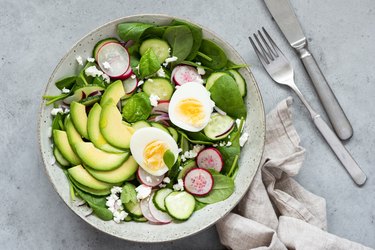
Lettuce may seem like a harmless food, but some people may find this salad mainstay can cause digestive difficulties. Lettuce isn't generally considered hard on the digestive tract, so the problem may stem from a medical condition, a food allergy or an intolerance.
Is Lettuce Hard to Digest?
Video of the Day
"Lettuce is usually very digestive," says Niket Sonpal, MD, an internist and gastroenterologist and an adjunct assistant professor at Touro College of Osteopathic Medicine in New York.
Video of the Day
However, it's important to remember that every individual — and every digestive system — is unique. "Digestion is different for everyone. There are many factors involved in what makes one food easily digestible for one person but not for another," notes Kris Sollid, RD, senior director of nutrition communications at the International Food Information Council in Washington, D.C.
One reason you may be concerned about your ability to digest lettuce is the unsettling experience of finding it in your stool. However, Dr. Sonpal says this isn't necessarily a cause for worry.
"Usually, foods that are fibrous will end up in your stool," says Dr. Sonpal. "Many vegetables and legumes, like corn, beans, lettuce, broccoli, kale and carrots, can end up being visible when they exit the body. This is usually not a cause for alarm unless there is an accompanying amount of blood, diarrhea or pain."
Read more: List of Foods High in Soluble Fiber
Health Conditions Affecting Lettuce Digestion
While eating leafy greens won't pose problems for most people, some medical conditions may make digesting lettuce painful. "GI conditions that might make consumption of lettuce uncomfortable could include IBS or an obstruction that may cause issues in general," says Dr. Sonpal. "Because lettuce is usually considered to be easy on the gut, booking an appointment with your doctor is important to make sure we find out what is causing this difficulty."
It is possible — though rare — to have a lettuce allergy or intolerance. "Lettuce allergies are not as common as allergies and intolerances to peanuts, dairy or shellfish," says Dr. Sonpal. "When we talk about intolerance to lettuce, we are usually looking at a case of lipid transfer protein syndrome, which is a condition that makes people excessively sensitive to a group of proteins found in plants."
Aside from medical conditions, there are other reasons you may experience digestive discomfort after eating a bowl of greens. Perhaps another ingredient in your salad doesn't agree with you, or the lettuce has been contaminated.
Alternatively, depending on how much lettuce you consume and what other roughage you have, the fiber content of your leafy greens could cause digestive upset, though, according to Sollid, it's unlikely to be from the lettuce alone. "Getting too much fiber can cause discomfort, but most people don't get a high percentage of their fiber from lettuce. For example, there is about 1 gram of fiber per cup of romaine."
Easy-to-Digest Vegetables
If lettuce does a number on your gut, you don't have to ditch veggies altogether. Because vegetables provide many important nutrients, it's smart to determine which ones you can eat without digestive complaints. Again, the list of easily digested vegetables may vary from one person to another.
"Everyone has different preferences when it comes to vegetables and digestive needs," says Sollid. "One way that everyone can increase the digestibility of vegetables, particularly starchy varieties, is to cook them. If you know that a certain vegetable causes GI distress, it's best to avoid eating it."
Figuring out which veggies you can comfortably digest may also be a matter of looking at their fiber content, because fiber is, by definition, indigestible material. According to the Mayo Clinic, a low-fiber diet can help lessen stool bulk, and you might want to try it and then gradually add back fiber. Canned veggies or those without skins or seeds (peel and remove any before eating) often have less fiber and may be good options.
- Niket Sonpal, MD, internist-gastroenterologist, adjunct assistant professor, Touro College of Osteopathic Medicine, New York
- Kris Sollid, RD, registered dietitian, senior director of nutrition communications, International Food Information Council, Washington, D.C.
- Mayo Clinic: “Low-fiber Diet Do’s and Don’ts”
Is this an emergency? If you are experiencing serious medical symptoms, please see the National Library of Medicine’s list of signs you need emergency medical attention or call 911.